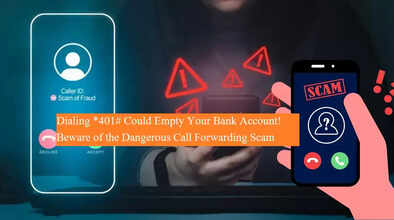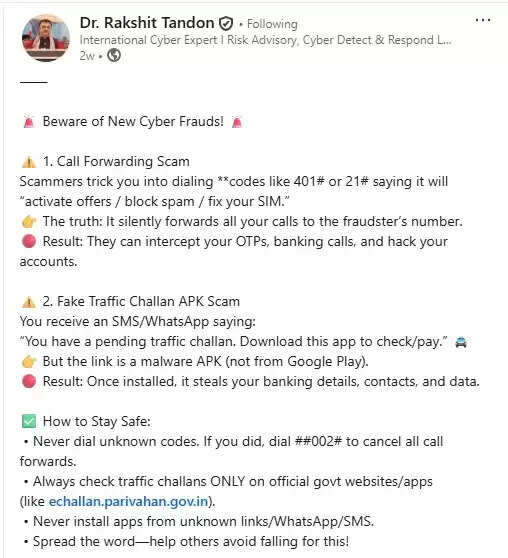Dialing *401# Could Empty Your Bank Account! Beware of the Dangerous Call Forwarding Scam

Cybercriminals are constantly devising new tricks to deceive people, and one of the latest and most alarming frauds is the call forwarding scam. Unlike traditional phishing where victims are lured into clicking suspicious links, this scam directly manipulates your phone settings, allowing hackers to intercept sensitive information such as one-time passwords (OTPs) and bank details.
If you ever receive a call asking you to dial a code like *401#, beware — it could give fraudsters complete access to your personal and financial information.
What Is the Call Forwarding Scam?
In this scam, fraudsters impersonate officials from your bank, mobile network provider, courier services, or even government agencies. They often claim that your account has been compromised, your number has unusual activity, or your parcel delivery has failed.
To “resolve” the issue, they trick you into dialing a USSD code such as *401#. Unknowingly, this activates call forwarding on your phone, meaning all your incoming calls get redirected to the scammer’s number.
Once your calls are rerouted, criminals can easily intercept OTPs sent by your bank or digital wallet. With this information, they can gain access to your accounts, initiate unauthorized transactions, and steal your hard-earned money.

How Scammers Exploit This Trick
-
By receiving redirected calls, they gain direct access to bank verification codes.
-
They can impersonate you while speaking with customer support teams.
-
With OTPs and personal data in hand, they can initiate fraudulent fund transfers, online purchases, and digital wallet thefts.
-
Victims often realize the fraud too late, after substantial financial damage.
Expert Warning on Call Forwarding Fraud
Cybersecurity expert Dr. Rakshit Tandon has raised concerns about this growing scam. On his LinkedIn post, he urged people never to dial any USSD code provided by strangers, especially *401#.
If you have already activated such call forwarding by mistake, he recommends immediately dialing ##002#. This code cancels all types of call forwarding on your device, cutting off the scammer’s access.
How to Protect Yourself from the *401# Scam
Here are some important safety steps to prevent falling victim:
-
Never share OTPs or passwords: No bank, government office, or service provider will ever ask for OTPs over the phone.
-
Do not follow random instructions: If someone tells you to dial a USSD code like *401#, disconnect the call immediately.
-
Verify with official sources: If you receive a suspicious call claiming to be from your bank or courier company, hang up and call the official customer care number directly.
-
Check your call settings regularly: Go into your phone’s call settings to ensure no unknown number is set up for call forwarding.
-
Cancel suspicious call forwarding: Dial ##002# to disable all types of call forwarding instantly.
Final Takeaway
The call forwarding scam is more dangerous than typical phishing because it gives fraudsters direct control over your incoming calls, enabling them to steal OTPs and other critical information.
By staying alert and refusing to dial unknown codes, you can protect yourself from such frauds. Remember: your bank or network provider will never ask you to activate call forwarding or share sensitive details over the phone.
Stay cautious, verify information through official channels, and regularly monitor your phone settings to ensure you remain safe from this growing cybercrime threat.

